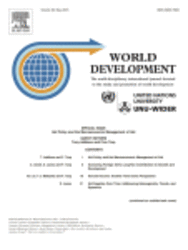Journal Article
Can Cities or Towns Drive African Development?
Economywide Analysis for Ethiopia and Uganda
Rapid urbanization is an important characteristic of African development and yet the structural transformation debate focuses on agriculture’s relative merits without also considering the benefits from urban agglomeration. As a result, African governments are often provided conflicting recommendations on the importance of rural agriculture or urban industry. We develop dynamic economywide models for Ethiopia and Uganda that capture both traditional aspects of the debate (growth linkages and foreign trade) and benefits from urbanization (internal migration and agglomeration effects). Simulations suggest that urban agglomeration is an important source of long-term growth and structural transformation, but that investing in cities does not greatly reduce national poverty over the short-term. In this regard, agricultural growth is more effective, albeit with slower national growth. Given these trade-offs, we conclude that, while urbanization’s benefits argue against an 'agro-fundamentalist' approach to African development, the short-term imperative of reducing poverty necessitates further agricultural investment.
 Join the network
Join the network